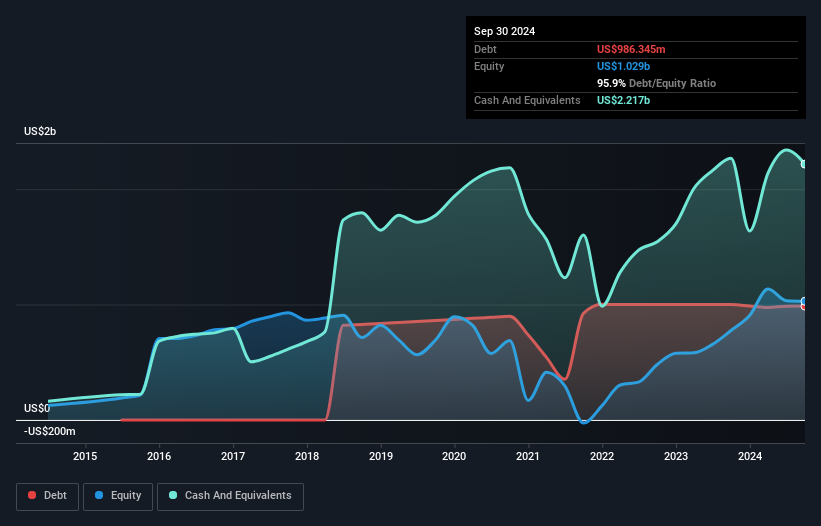Legendary fund manager Li Lu (who Charlie Munger backed) once said, 'The biggest investment risk is not the volatility of prices, but whether you will suffer a permanent loss of capital.' So it seems the smart money knows that debt - which is usually involved in bankruptcies - is a very important factor, when you assess how risky a company is. Importantly, Atlassian Corporation (NASDAQ:TEAM) does carry debt. But is this debt a concern to shareholders?
When Is Debt A Problem?
Debt assists a business until the business has trouble paying it off, either with new capital or with free cash flow. Ultimately, if the company can't fulfill its legal obligations to repay debt, shareholders could walk away with nothing. However, a more common (but still painful) scenario is that it has to raise new equity capital at a low price, thus permanently diluting shareholders. Having said that, the most common situation is where a company manages its debt reasonably well - and to its own advantage. The first thing to do when considering how much debt a business uses is to look at its cash and debt together.
Check out our latest analysis for Atlassian
What Is Atlassian's Debt?
The chart below, which you can click on for greater detail, shows that Atlassian had US$986.3m in debt in September 2024; about the same as the year before. But on the other hand it also has US$2.22b in cash, leading to a US$1.23b net cash position.

How Healthy Is Atlassian's Balance Sheet?
The latest balance sheet data shows that Atlassian had liabilities of US$2.44b due within a year, and liabilities of US$1.53b falling due after that. Offsetting this, it had US$2.22b in cash and US$484.1m in receivables that were due within 12 months. So its liabilities total US$1.26b more than the combination of its cash and short-term receivables.
This state of affairs indicates that Atlassian's balance sheet looks quite solid, as its total liabilities are just about equal to its liquid assets. So while it's hard to imagine that the US$65.4b company is struggling for cash, we still think it's worth monitoring its balance sheet. Despite its noteworthy liabilities, Atlassian boasts net cash, so it's fair to say it does not have a heavy debt load! The balance sheet is clearly the area to focus on when you are analysing debt. But it is future earnings, more than anything, that will determine Atlassian's ability to maintain a healthy balance sheet going forward. So if you're focused on the future you can check out this free report showing analyst profit forecasts.
In the last year Atlassian wasn't profitable at an EBIT level, but managed to grow its revenue by 23%, to US$4.6b. Shareholders probably have their fingers crossed that it can grow its way to profits.
So How Risky Is Atlassian?
Although Atlassian had an earnings before interest and tax (EBIT) loss over the last twelve months, it generated positive free cash flow of US$1.3b. So taking that on face value, and considering the net cash situation, we don't think that the stock is too risky in the near term. The good news for Atlassian shareholders is that its revenue growth is strong, making it easier to raise capital if need be. But we still think it's somewhat risky. The balance sheet is clearly the area to focus on when you are analysing debt. But ultimately, every company can contain risks that exist outside of the balance sheet. These risks can be hard to spot. Every company has them, and we've spotted 1 warning sign for Atlassian you should know about.
Of course, if you're the type of investor who prefers buying stocks without the burden of debt, then don't hesitate to discover our exclusive list of net cash growth stocks, today.
New: Manage All Your Stock Portfolios in One Place
We've created the ultimate portfolio companion for stock investors, and it's free.
• Connect an unlimited number of Portfolios and see your total in one currency
• Be alerted to new Warning Signs or Risks via email or mobile
• Track the Fair Value of your stocks
Have feedback on this article? Concerned about the content? Get in touch with us directly. Alternatively, email editorial-team (at) simplywallst.com.
This article by Simply Wall St is general in nature. We provide commentary based on historical data and analyst forecasts only using an unbiased methodology and our articles are not intended to be financial advice. It does not constitute a recommendation to buy or sell any stock, and does not take account of your objectives, or your financial situation. We aim to bring you long-term focused analysis driven by fundamental data. Note that our analysis may not factor in the latest price-sensitive company announcements or qualitative material. Simply Wall St has no position in any stocks mentioned.
About NasdaqGS:TEAM
Atlassian
Provides a collaboration software that enables organizations to connect all teams through a system of work that unlocks productivity at scale worldwide.
Flawless balance sheet with high growth potential.
Similar Companies
Market Insights
Community Narratives



